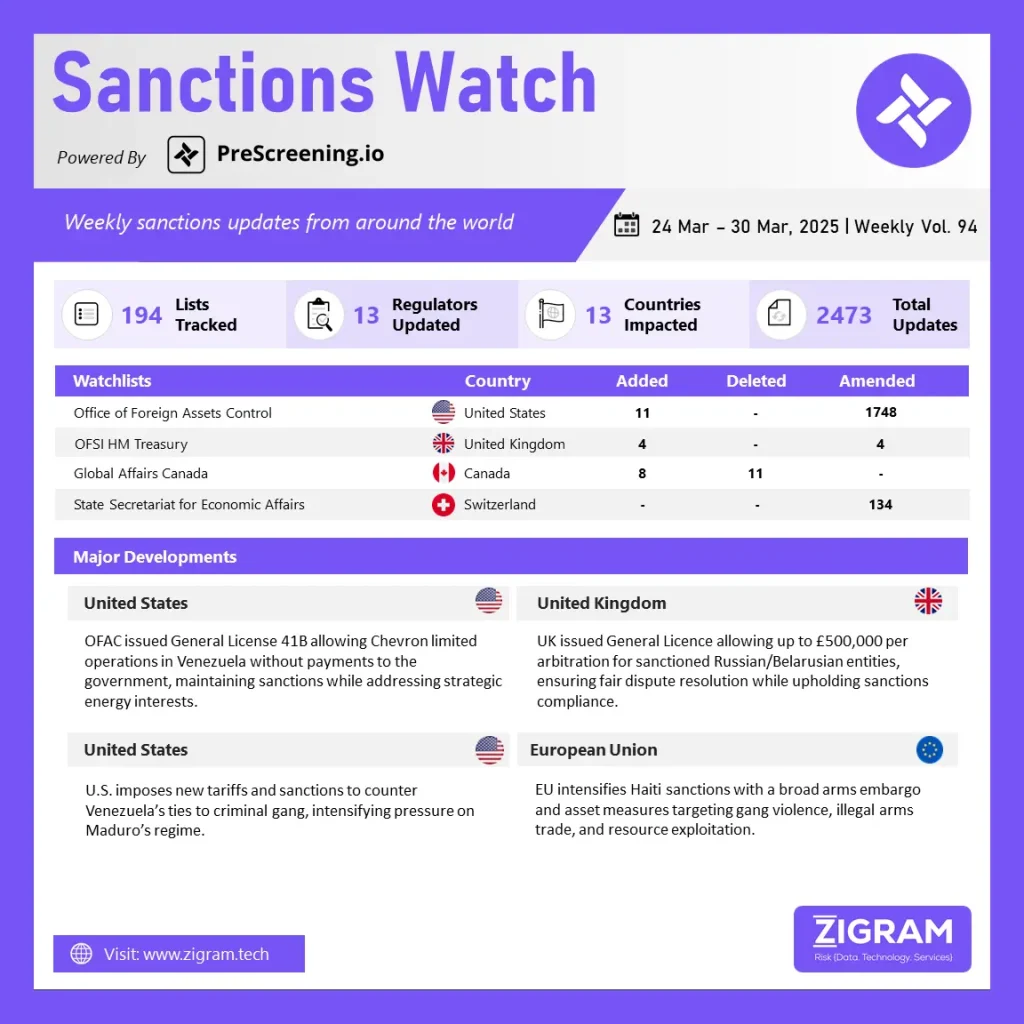Sanctions Watch Vol 94
In the latest edition of our Sanctions Watch weekly digest, we present significant updates on sanction watchlists and regulatory developments.
1. Issuance of Amended Venezuela-related General License
The U.S. Treasury’s Office of Foreign Assets Control (OFAC) issued General License No. 41B, extending limited authorization for Chevron Corporation to continue winding down certain operations in Venezuela. This license, valid until May 27, 2025, permits Chevron and its subsidiaries to carry out necessary transactions related to their joint ventures with Venezuela’s state-run oil company, Petróleos de Venezuela, S.A. (PdVSA), which are otherwise prohibited under existing sanctions.
However, the license imposes key restrictions. It does not allow any payments to the Government of Venezuela, including taxes or royalties, nor does it permit dividends to PdVSA. Additionally, Chevron is barred from exporting petroleum to countries other than the U.S., from engaging with Russian-controlled entities in Venezuela, and from expanding into new oil fields.
This measured easing aims to maintain pressure on the Maduro regime while allowing limited U.S. corporate activity under tight controls. The move reflects Washington’s continued balancing act between sanctions enforcement and strategic energy interests in the region.
2. Arbitration Costs Licence – March 2025, UK Treasury
The UK Treasury’s Office of Financial Sanctions Implementation (OFSI) issued General Licence INT/2025/5787748, allowing specific payments related to arbitration proceedings involving sanctioned Russian or Belarusian entities. Under the licence, individuals or entities—excluding those designated under sanctions—may make payments up to £500,000 per arbitration to cover arbitration costs. This includes fees for arbitrators, arbitration associations, and legal representatives acting on behalf of sanctioned persons.
The licence permits direct payments to UK-regulated financial institutions and allows them to process such transactions. However, it explicitly prohibits the release of funds that would breach broader sanctions laws, except as stated in the licence.
This development aims to ensure fair dispute resolution in international arbitration, even involving designated parties, while maintaining the integrity of the UK’s sanctions regime. All payments must be reported within 30 days to OFSI and properly documented for six years.
The measure balances legal due process with sanctions enforcement, reflecting the UK’s ongoing efforts to address the complexities of enforcing sanctions without obstructing lawful arbitration mechanisms.
3. U.S. President Orders New Tariffs to Counter Venezuelan Threat and Criminal Activities
U.S. President issued a new executive order expanding economic sanctions on Venezuela and authorizing a 25% tariff on goods from countries importing Venezuelan oil. This action, grounded in the International Emergency Economic Powers Act and related statutes, responds to the ongoing national emergency first declared in 2015. The order specifically targets the escalating threat posed by Venezuela’s support for the transnational criminal gang Tren de Aragua, now designated as a Foreign Terrorist Organization. The gang is implicated in violent crimes, including political assassinations and illegal infiltration into the U.S.
The executive order reaffirms existing sanctions under prior orders and introduces measures that may impact global trade. Countries importing Venezuelan oil, directly or through intermediaries, risk facing tariffs unless they cease such activities. Enforcement will be led by the Secretaries of State, Commerce, Treasury, and Homeland Security, with periodic reviews every 180 days. This marks a significant intensification of U.S. pressure on the Maduro regime amid continued political instability, economic mismanagement, and regional humanitarian crises. The order takes effect on April 2, 2025.
4. EU Expands Arms Embargo and Sanctions Over Haiti Crisis
The Council of the European Union adopted Council Decision (CFSP) 2025/601, amending its earlier decision (CFSP) 2022/2319 concerning restrictive measures in view of the worsening situation in Haiti. This update aligns the EU’s sanctions framework with the recent United Nations Security Council Resolution 2752 (2024), which underscored the threat posed by rampant gang violence, illicit arms trafficking, and overall lawlessness in Haiti, deeming the situation a danger to regional and international peace.
The decision imposes a broad arms embargo on Haiti, prohibiting the direct or indirect supply, sale, or export of weapons, ammunition, military vehicles, and paramilitary equipment from EU Member States or their nationals. It also bans technical training, financial assistance, and brokering services linked to military activities or the maintenance and use of arms and related materiel. These prohibitions apply regardless of the origin of the materials.
Exemptions to the embargo are narrowly defined. Supplies intended for UN missions, UN-authorized operations, or for humanitarian or protective use—and which contribute to peace and stability—may be permitted under strict conditions, including advance approval by the UN Sanctions Committee.
Additionally, the updated sanctions expand the criteria for individual and entity listings. The EU now includes those engaged in the illicit exploitation or trade of natural resources within Haiti. This step targets the financial underpinnings of gang activity and is intended to curb funding mechanisms that fuel violence and undermine governance and the rule of law.
The Council’s decision emphasizes the EU’s commitment to supporting Haiti’s peace and stability efforts and ensuring consistency with UN mandates. The amendments came into force on March 25, 2025, upon their publication in the Official Journal of the European Union.
Know more about the product: PreScreening.io
Click here to book a free demo.
Sanctions Watch is a weekly recap of events and news related to sanctions around the world.
- #OFAC
- #ChevronSanctions
- #OFACLicense
- #VenezuelaOil
- #PdVSA
- #USSanctions
- #UKSanctions
- #OFSI
- #ArbitrationLicense
- #RussiaSanctions
- #BelarusSanctions
- #HaitiCrisis
- #EUSanctions
- #ArmsEmbargo
- #HumanitarianExceptions
- #TrenDeAragua
- #TerrorDesignation
- #USExecutiveOrder
- #TariffsOnVenezuelanOil
- #InternationalSanctions
- #UNSanctionsCompliance
